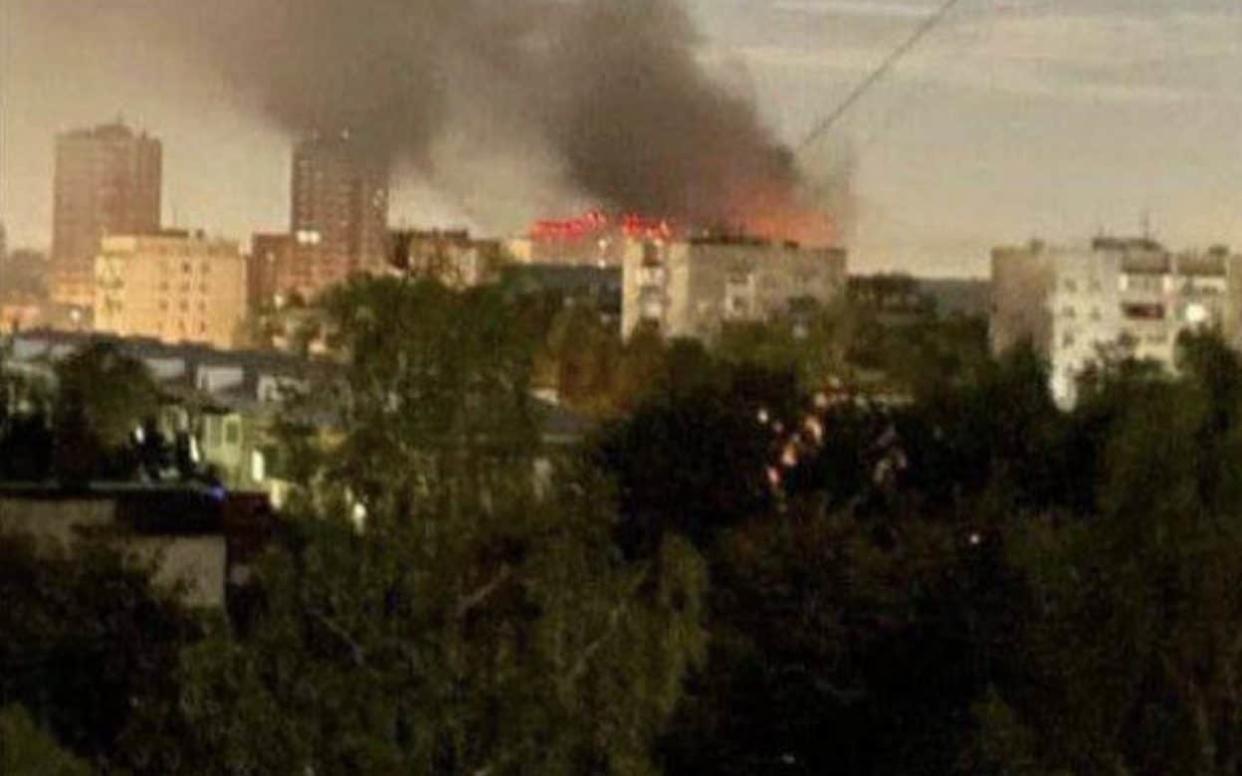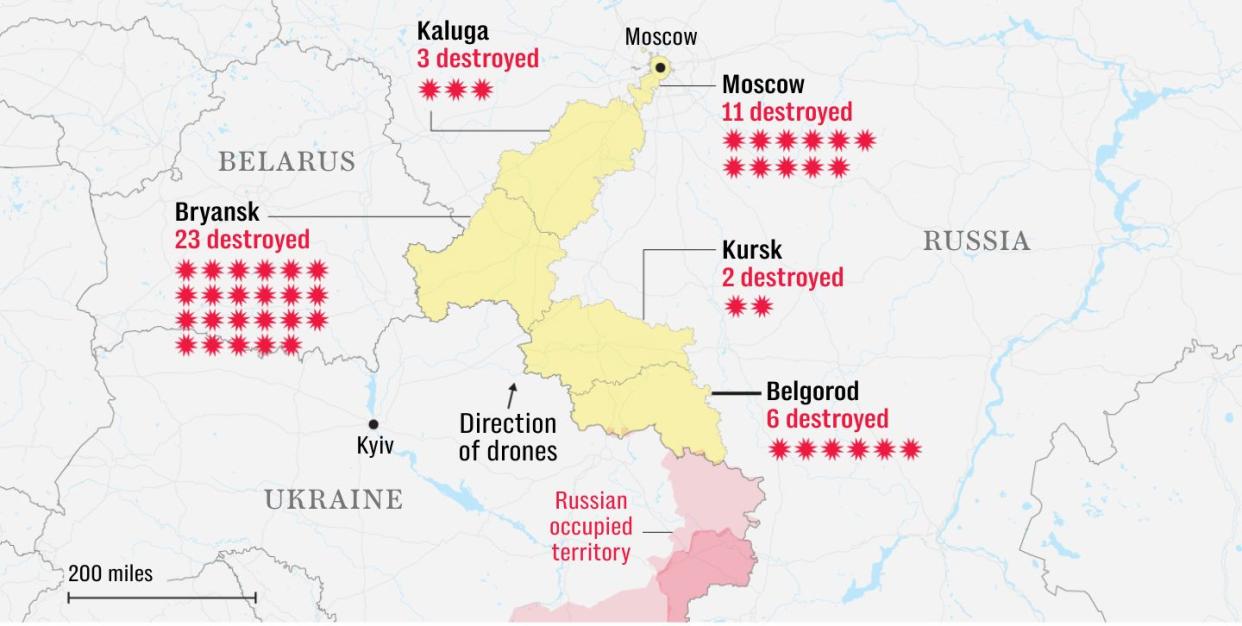Ukraine’s largest drone barrage on Moscow forces closure of airports
Ukraine launched its largest drone strike on Moscow early on Wednesday, prompting Russia to temporarily close airports more than 1,000 miles away over fears of further attacks.
All flights were cancelled and the airspace restricted over the Arctic cities of Murmansk, which hosts a military airbase, and Apatity.
There were unverified reports that an unmanned aircraft had been shot down in the area, which would mark the furthest a Ukrainian drone had flown into Russian territory so far.
Andrei Chibis, Murmansk’s regional governor, warned of a drone threat detected in the region on Telegram, writing that “the necessary security measures were being taken”.
Rosaviatsia, Russia’s aviation watchdog, confirmed the closures, saying that flight safety is the “priority”. Later, it announced the threat had passed and the airports had resumed operations.

It comes after Kyiv launched what Sergey Sobyanin, Moscow’s mayor, described as “one of the largest” aerial attacks against the Russian capital since war broke out in February 2022.
About 45 Ukrainian drones were downed, including 11 destroyed over the Moscow region, Russia’s ministry of defence claimed.

Russian media shared unverified videos of the attack, but Ukraine’s military is yet to claim responsibility for the air strikes. Temporary restrictions were put in place at Vnukovo, Domodedovo and Zhukovsky airports.
Ukrainian forces regularly carry out drone strikes and sabotage acts on Russian territory, focusing on strategic targets such as military bases, oil refineries and industrial facilities.
An oil refinery in Russia’s Rostov region has been burning for four days following a Ukrainian drone strike on Sunday, with more than 500 firefighters continuing to battle the blaze.
Separately, Ukraine’s air force claims it struck the position of a Russian S-300 air defence system in Rostov, with local authorities also reporting the downing of a missile.
The scaling up of attacks on Russia comes during Ukraine’s surprise incursion into the Kursk region on Aug 6. Kyiv claims it has seized control of 93 settlements and about 480 sq miles of enemy territory.
According to Ukraine, its troops continue to advance in the Kursk region and have destroyed a number of bridges and pontoons.
Oleksandr Syrskyi, Ukraine’s top commander, said on Wednesday that his forces have reached between 18 and 22 miles into Kursk.
Andrei Belousov, Russia’s defence minister, said the army had finished forming three new military groupings to bolster security in regions bordering Ukraine.
Yurko, a Ukrainian soldier fighting in Russia who did not want to use his full name, told The Telegraph: “Ukraine confidently controls the territories in the Kursk region. Russian attempts to counter-attack are not successful.”
The Kursk operation is the biggest foreign attack on Russia’s territory since the Second World War and has been seen as a huge boost for flagging morale among Ukraine’s tired troops, as well as a strategic gain for the country.
Moscow has used state media and propaganda to tell Russian citizens that the presence of Ukrainian forces on its soil is the “new normal”, repurposing messaging used during the pandemic.
Kremlin officials reportedly said they believed Kyiv’s invasion of Kursk will last for several months.
They have retaliated with heavy shelling of the Ukrainian city of Sumy, which is over the border from Kursk, forcing people to flee the area, with the authorities saying 45,000 must leave.
Local media reported that Russian citizens who had fled Kursk were also being treated in Sumy.
However, Russia is continuing its grinding advance in Ukraine’s east.
The Donbas city of Pokrovsk, a defensive stronghold and logistical hub, is under the biggest threat, with about a third of Tuesday’s clashes taking place in front-line areas nearby.
Local authorities have ordered an evacuation of the city, warning tens of thousands of residents they have two weeks to flee encroaching Russian troops.
The capture of Pokrovsk would compromise Ukraine’s defensive abilities and supply routes. It would also bring Russia closer to capturing the entire Donetsk region, where it currently occupies 18 per cent of Ukraine’s territory.
Russia claimed on Wednesday that it had control of the village of Zhelanne in the Pokrovsk area, the latest in a string of small settlements taken by Moscow’s forces in recent days.
Analysts believe Russia wants to defeat the incursion and exploit the resulting depletion of Ukraine’s resources by pushing forward with its assault on Pokrovsk.
Meanwhile on Wednesday, Ukraine’s parliament voted to join the International Criminal Court (ICC), as Kyiv seeks to bring Russia to justice over alleged war crimes committed throughout the invasion.
Ukraine signed the Rome Statute that founded the court in 2000, but had not ratified it, as some political and military figures expressed fears Ukrainian soldiers could face prosecution.
Dmytro Kuleba, Ukraine’s foreign minister, called the move “historic” after a “long journey full of challenges, myths and fears”, adding: “Ukraine joining the ICC is a key requirement for the country to eventually join the European Union”.


